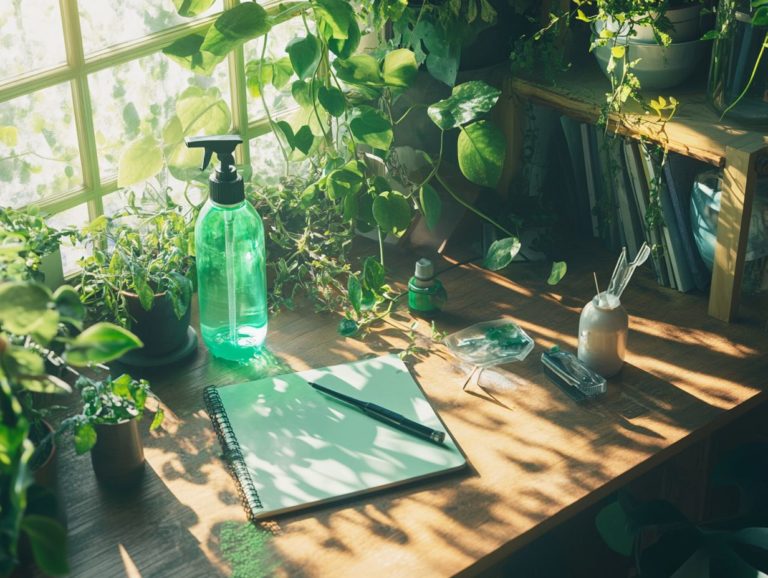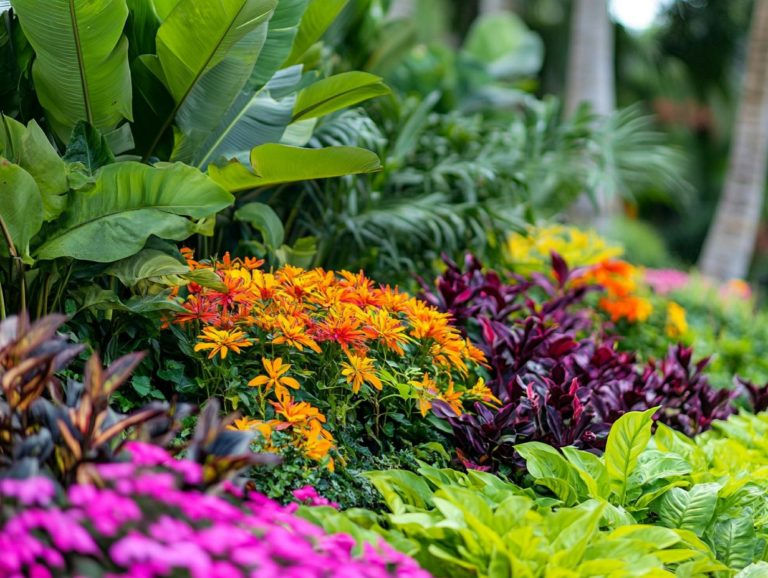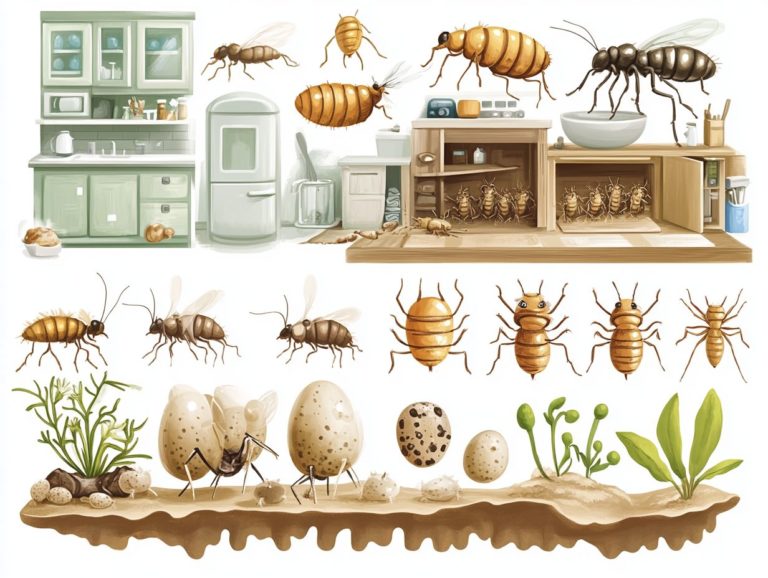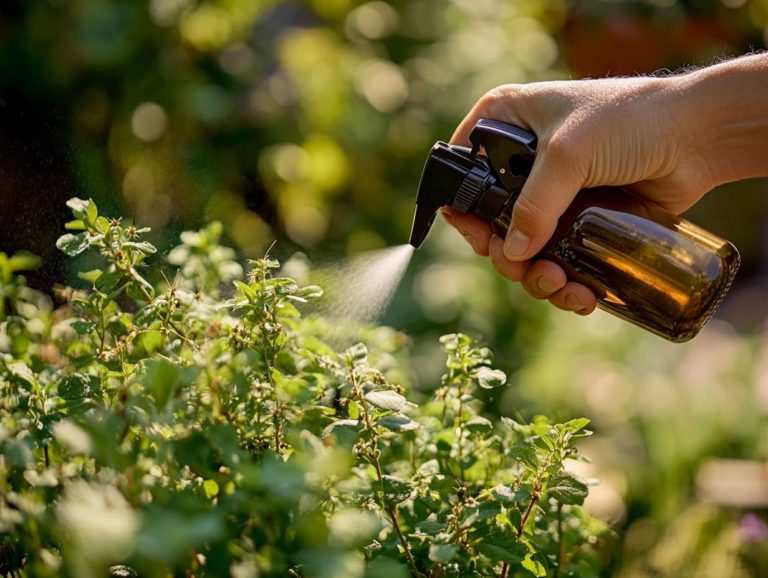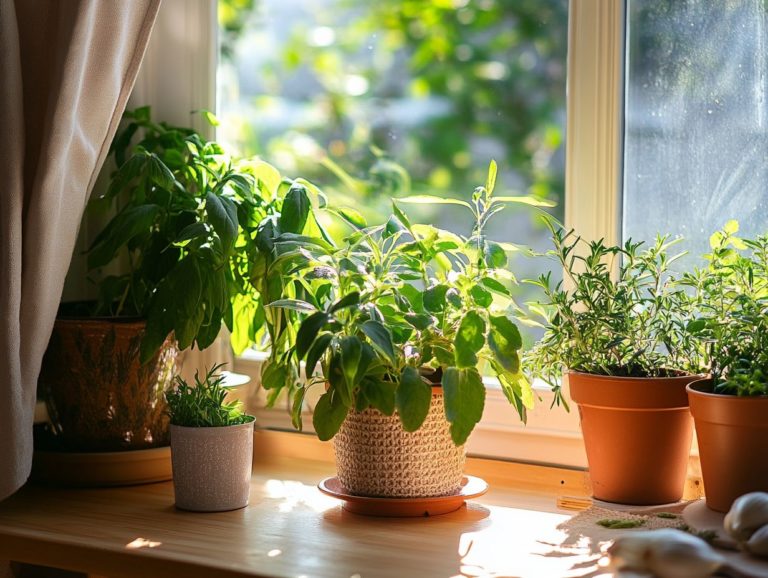Effective Pesticides for Indoor Plant Care
Caring for indoor plants can be a rewarding endeavor, yet pests can transform that joy into frustration. Understanding the role of pesticides, such as Natria Insecticidal Soap and BioAdvanced Organics, is important for maintaining the health and vitality of your leafy companions.
This article provides essential tips for safe application and ongoing maintenance, ensuring your plants thrive while remaining beautifully pest-free. Techniques like pesticide application with Mosqueda Sticky Traps enhance pest prevention.
Contents
- Key Takeaways:
- Pesticides for Indoor Plant Care
- Types of Pesticides
- Factors to Consider When Choosing Pesticides
- Application and Effectiveness of Pesticides
- Frequently Asked Questions
- Got Questions About Indoor Plant Care? Here Are Some Answers!
- 1. What are effective pesticides for indoor plant care?
- 2. Are natural pesticides as effective as chemical pesticides for indoor plants?
- 3. Do I need to apply pesticides to my indoor plants even if they don’t have any visible pests?
- 4. Can I use outdoor pesticides on my indoor plants?
- 5. How often should I apply pesticides to my indoor plants?
- 6. Are there any alternative methods to using pesticides for indoor plant care?
Key Takeaways:
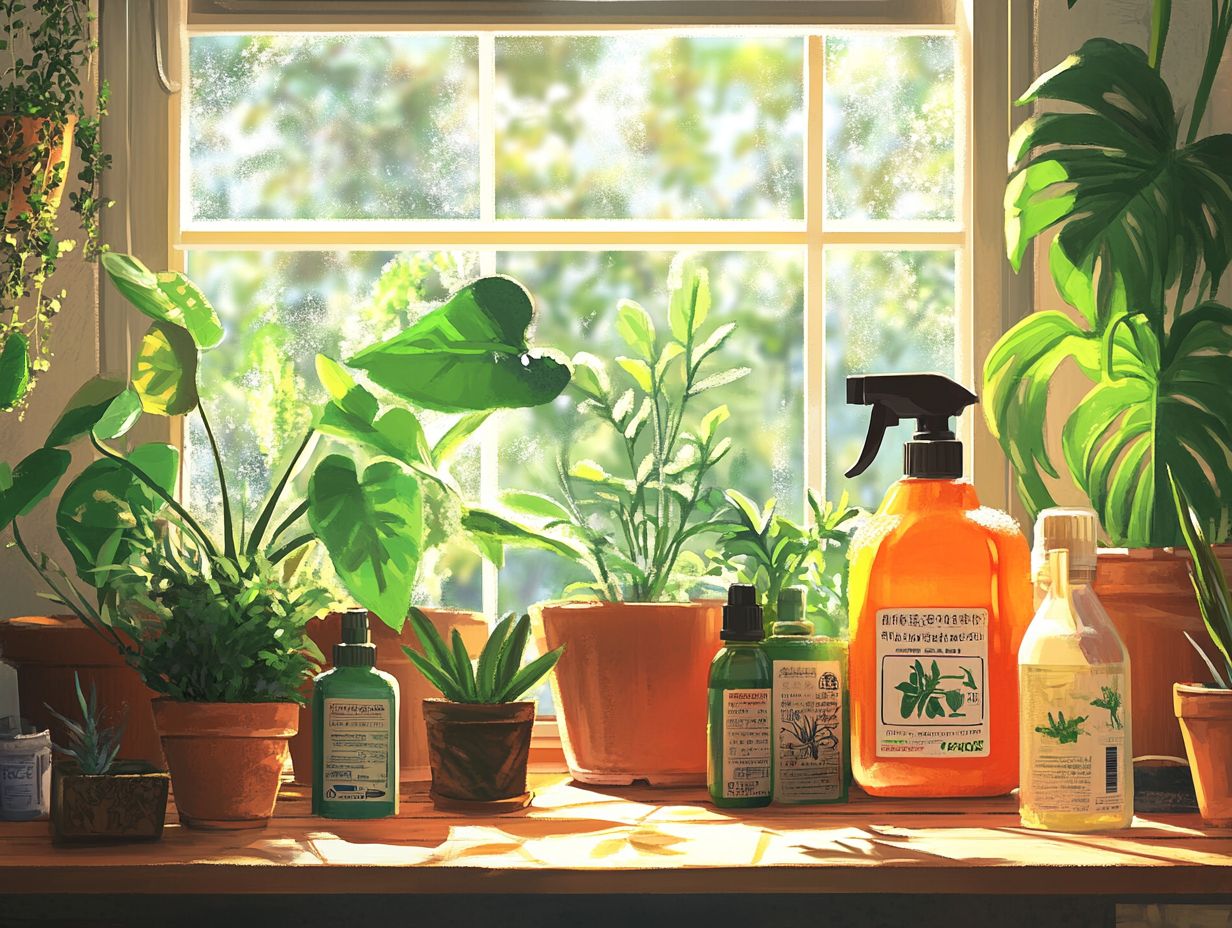
- Choose pesticides based on plant type and pest problem to control infestations effectively without harming the plant.
- Consider the safety and environmental impact of pesticides before application. Natural and organic options, like Neem oil and Castile Soap, may be safer for indoor plant care.
- Proper application techniques and regular maintenance are crucial for the effectiveness of pesticides in controlling pest problems and maintaining healthy indoor plants.
Pesticides for Indoor Plant Care
Pesticides are vital for preserving the health and vibrancy of your houseplants, especially against persistent pests like spider mites, aphids, mealybugs, whiteflies, and fungus gnats.
Indoor gardening is rewarding but presents challenges, particularly in pest prevention and plant upkeep. By understanding the types and applications of pesticides, including insecticidal soaps and DIY insect sprays, you can enhance your plant care routine with safe and effective methods.
With options like Natria Insecticidal Soap and BioAdvanced Organics, achieving a thriving indoor garden is well within your reach.
Understanding the Need for Pesticides
Recognizing the necessity of pesticides in indoor plant care is important for combating houseplant pests that can impede the growth of your plants.
These pests, such as spider mites and aphids, damage leaves and cause complications like stunted growth and dieback. It’s essential for plant enthusiasts to be vigilant and recognize signs of infestations early.
While traditional pesticides have been common solutions, consider exploring alternatives that align with a more sustainable approach. Organic pest control methods, such as introducing insects that help control pests or utilizing natural insecticidal soaps, can manage pest populations without harming plant health or the environment.
Embrace these environmentally friendly methods to cultivate a vibrant indoor garden while prioritizing the well-being of your plants and the delicate ecosystem that supports them.
Types of Pesticides
In indoor gardening, understanding the various types of pesticides available is crucial for successful pest management. This knowledge helps keep your plants thriving and vibrant.
Chemical Pesticides
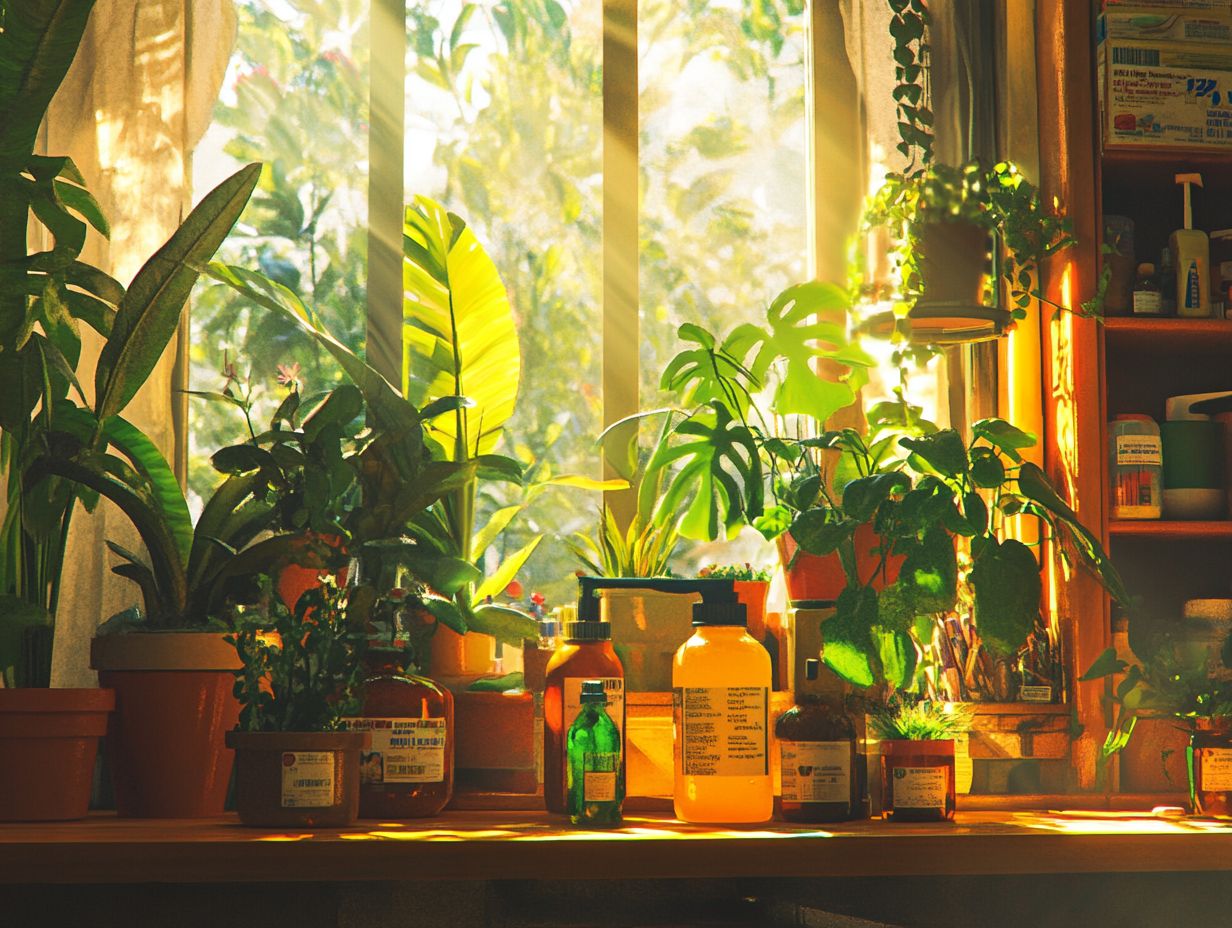
Chemical pesticides, including systemic insecticides (insecticides that are absorbed by the plant and affect pests that feed on it) and pyrethrins, can serve as effective solutions for immediate insect control. However, it’s important to consider the implications concerning safety and environmental impact.
These substances are designed to target and eliminate a variety of pests quickly, making them appealing for both agricultural and domestic use. Weigh the pros and cons carefully, including the potential risks, such as harm to beneficial insects like pollinators and negative effects on soil and water quality.
To maximize effectiveness and minimize exposure, proper application methods are crucial, especially when using products like Garden Safe Diatomaceous Earth. When using these products, be sure to follow safety precautions: wearing protective clothing and ensuring adequate ventilation are key steps to mitigate health risks related to accidental inhalation or skin contact.
Natural and Organic Pesticides
Natural and organic pesticides like Natria Insecticidal Soap, BioAdvanced Organics, and Bonide Captain Jack’s Neem Oil (a natural oil that comes from the seeds of the neem tree and helps repel pests), along with vegetable oil, offer eco-friendly options for effective pest management without the harmful impacts of traditional chemicals.
These products do more than just protect your plants; they enhance the overall health of your garden ecosystem by reducing harmful toxicity levels in the soil. When dealing with common pests such as whiteflies, fungus gnats, and houseplant insects, these natural solutions can significantly disrupt their life cycles.
For example, Garden Safe Diatomaceous Earth serves as a physical barrier, damaging the exoskeletons of insects, while neem oil and pyrethrins interfere with pest hormones, effectively preventing reproduction.
By opting for these alternatives, you can cultivate thriving, pest-free plants, embracing a sustainable gardening approach that benefits both your environment and your home garden.
Factors to Consider When Choosing Pesticides
When choosing pesticides for your indoor plants, it s essential to consider a few key factors. Start by identifying the type of plant you have, including houseplants, and the specific pests causing trouble.
Consider the safety of the pesticide you select, including its toxicity, as well as its impact on the environment. Making informed choices will help ensure the health of your plants and the well-being of your indoor space. Additionally, preventing pest infestations in indoor plants is crucial for maintaining a thriving indoor garden.
Plant Type and Pests
Understanding the connection between the types of plants you nurture and the specific pests that may target them is essential for effective pest management in indoor gardening. Different houseplants can attract a variety of pests, including spider mites, aphids, mealybugs, and whiteflies.
For example, succulent varieties often become a favorite hiding spot for mealybugs, while peace lilies might find themselves under siege by aphids or spider mites. Recognizing early signs of infestation like yellowing leaves or the presence of webbing is crucial. The sooner you act, the better chance you have against pests!
Utilizing tailored pest control methods, such as introducing beneficial insects, applying insecticidal soaps, or using neem oil and Mosqueda Sticky Traps, can prove particularly effective. Maintaining plant health through proper watering, optimal light conditions, and adequate humidity will bolster their resilience against invaders.
By staying vigilant and proactive, you can protect your indoor oasis from unwelcome pests.
Safety and Environmental Impact
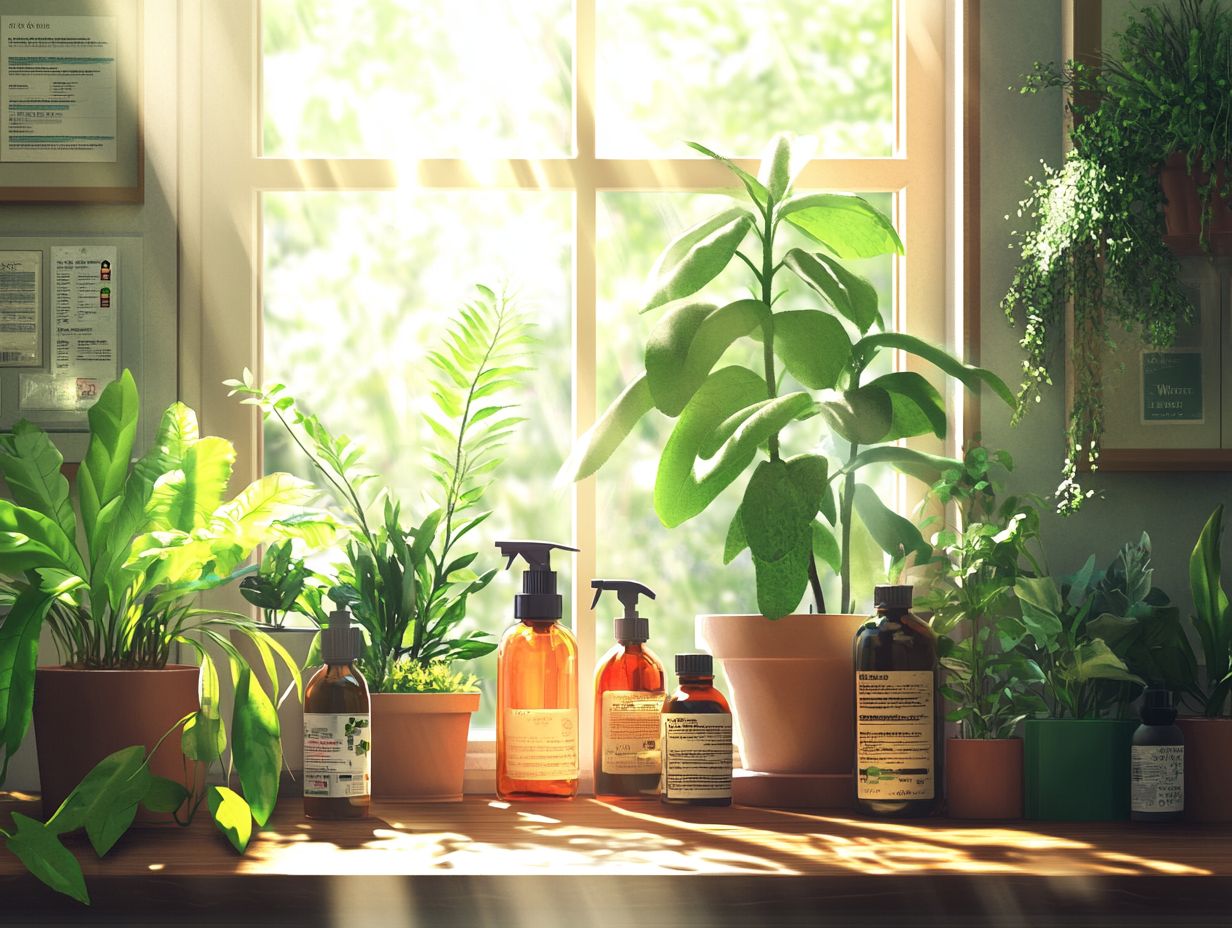
When selecting pesticides, consider safety and environmental impact. Both chemical and organic options can significantly influence your indoor environment and overall health.
Chemical pesticides can effectively tackle pests but may carry substantial risks. These include potential contamination of soil and water, harm to non-target organisms, and negative health effects for both humans and pets, including exposure to Imidacloprid, a common pesticide.
Organic pest control methods, often made from natural ingredients like potassium fatty acids and plant oil extracts, reduce these risks and foster a healthier ecosystem. Always follow the application instructions included with any pesticide for responsible usage. This enhances treatment effectiveness and helps minimize environmental harm, protecting both biodiversity and human well-being.
Application and Effectiveness of Pesticides
Proper application techniques maximize the effectiveness of pesticides, whether you re using insecticidal soaps, choosing natural alternatives, or crafting DIY insect sprays to combat pesky houseplant invaders.
Proper Application Techniques
Use proper application techniques to achieve desirable results with pesticides. Misapplying can lead to ineffective pest control or harm to your plants.
Begin with thorough preparation. Assess the specific pest problem, select the right pesticide (options include BioAdvanced Organics and Garden Safe Diatomaceous Earth), and carefully read the label. To effectively tackle indoor plant issues, refer to how to identify common indoor plant pests. This step provides the correct dosage and any necessary protective equipment.
Employ techniques like spot treatment or thorough coverage with sticky traps to enhance results. Timing matters applying pesticides during optimal weather conditions boosts their performance.
Post-application care is just as crucial. Regularly monitor treated areas and adjust strategies as needed. Sticking to the manufacturer s instructions ensures safety and maximizes effectiveness.
Expected Results and Maintenance
Understand what to expect from pesticide use to manage your plant maintenance strategy. This knowledge helps you make informed decisions about your pest control efforts, especially regarding houseplant pests.
After applying pesticides, expect a noticeable decline in pest activity within a few days to a couple of weeks, depending on the product and severity of infestation. Signs of effective pest control include the absence of visible pests, healthier foliage, and improved plant vigor.
A one-time treatment may not suffice. Routine monitoring and maintenance are vital for a thriving garden. Regular checks help spot new pest threats early, enabling timely interventions that enhance long-term effectiveness.
Watch this video for tips on effective pest control techniques!
Frequently Asked Questions
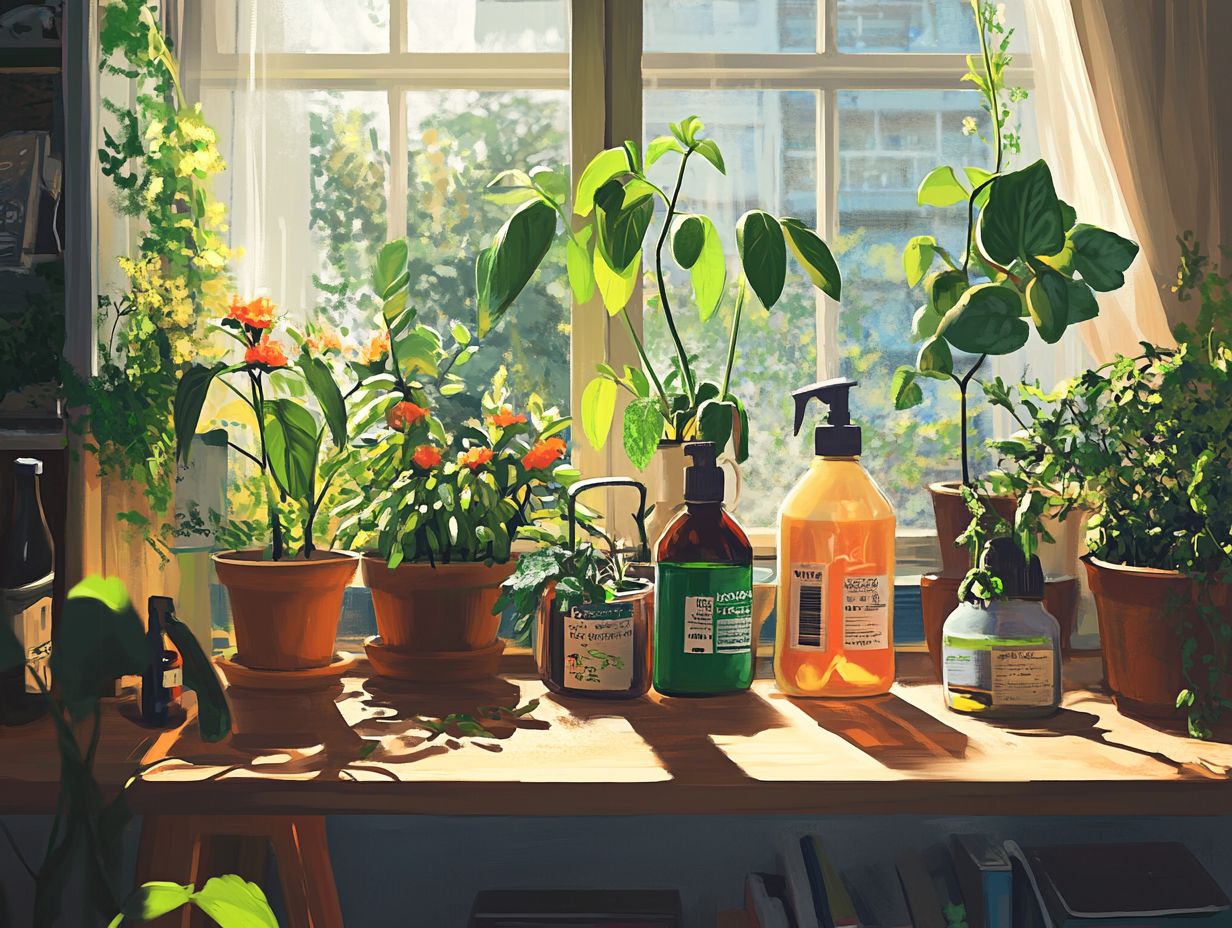
Got Questions About Indoor Plant Care? Here Are Some Answers!
1. What are effective pesticides for indoor plant care?
Effective pesticides for indoor plant care target and eliminate common pests such as mealybugs, aphids, and spider mites. They should also be safe for use around humans and pets.
2. Are natural pesticides as effective as chemical pesticides for indoor plants?
Yes, several natural pesticide options can be just as effective as chemical pesticides for indoor plants. These include neem oil, diatomaceous earth, and essential oils like peppermint and eucalyptus.
3. Do I need to apply pesticides to my indoor plants even if they don’t have any visible pests?
It’s smart to take preventive action for your indoor plants. Regularly applying a mild pesticide can stop bug problems and keep your plants thriving.
4. Can I use outdoor pesticides on my indoor plants?
No! Outdoor pesticides are dangerous for indoor plants and can harm you too. Always choose pesticides specifically labeled for indoor use.
5. How often should I apply pesticides to my indoor plants?
This depends on the pesticide and how serious any pest problem is. Always follow the label for the best application schedule.
6. Are there any alternative methods to using pesticides for indoor plant care?
Absolutely! You can use sticky traps, clean your plants regularly, and even introduce natural helpers like ladybugs to control pests.

